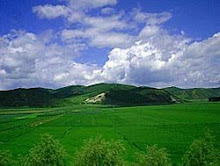Pakistan Said It Killed 60 Militants
 Pakistan said it killed 60 militants and lost 11 soldiers as a 30,000-strong attack force pushed into Taliban's tribal stronghold on the second day of a major operation.Taliban fighters offered fierce resistance as ground troops, backed by warplanes and artillery, pushed into South Waziristan, the mountain headquarters of the notorious Tehrik I Taliban Pakistan (TTP).
Pakistan said it killed 60 militants and lost 11 soldiers as a 30,000-strong attack force pushed into Taliban's tribal stronghold on the second day of a major operation.Taliban fighters offered fierce resistance as ground troops, backed by warplanes and artillery, pushed into South Waziristan, the mountain headquarters of the notorious Tehrik I Taliban Pakistan (TTP).Militants detonated roadside bombs and opened fire on helicopter gunships. Villagers, some of them women, waved white flags and troops searching houses discovered large weapons caches, the military said.In a statement it said tactical heights near Razmak, a mountain village at the northern edge of South Waziristan, had been captured following fighting that killed 10 militants and two soldiers.
The Taliban denied the army claims, and a spokesman insisted the guerrillas had inflicted "heavy casualties" and forced the invading soldiers back into their bases. "We know how to fight this war and defeat the enemy with the minimum loss of our men," Azam Tariq told the Associated Press from an undisclosed location.
The conflicting versions were impossible to reconcile. Inaccessible at the best of times, much of South Waziristan has been sealed off since the operation started on Saturday morning. Phone connections to Waziristan and nearby areas have been disconnected.The fight, pitting 30,000 soldiers against 10,000 Taliban and al-Qaida miltants, according to the army, followed two weeks of audacious assaults in cities that left over 175 people dead and underlined the militant threat to national stability.
(Left: Supporters of the Pakistani religious party Jamaat-e-Islami gather around a U.S. flag after setting it on fire during a rally against the recently-signed Kerry-Lugar bill, Sunday, Oct. 18, 2009 in Karachi.)Intelligence officials said Saturday that the ground troops were advancing on two flanks and a northern front of a central part of South Waziristan controlled by the Mehsuds. The areas being surrounded include the insurgent bases of Ladha and Makeen, the officials said on condition of anonymity because they were not allowed to brief the media.
As many as 150,000 civilians - possibly more - have left in recent months after the army made clear it was planning an assault, but as many as 350,000 could still be in the region. The United Nations has been stockpiling relief supplies in a town near the region, but authorities are not expecting a major refugee crisis like the one that occurred during the offensive this year in the Swat Valley.Over the last three months, the Pakistani air force has been bombing targets in South Waziristan, while the army has said it has sealed off many Taliban supply and escape routes. The military has been trying to secure the support of local tribal armies in the fight.


















